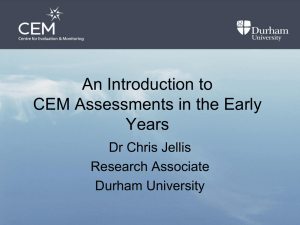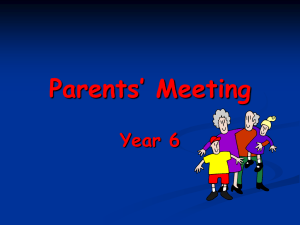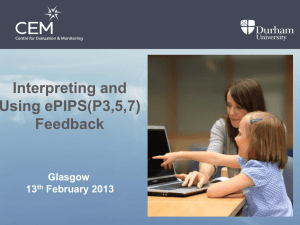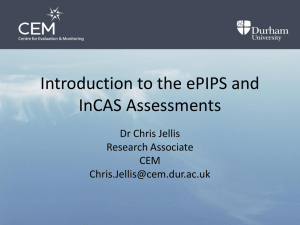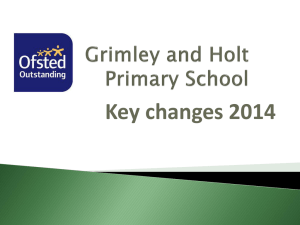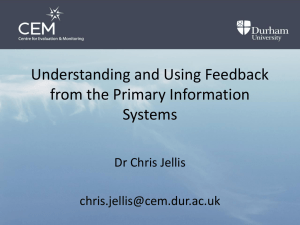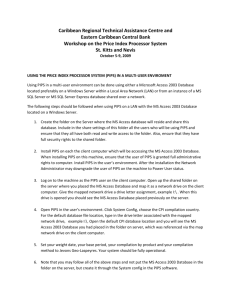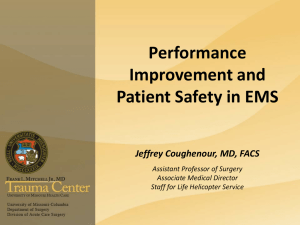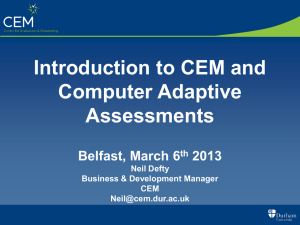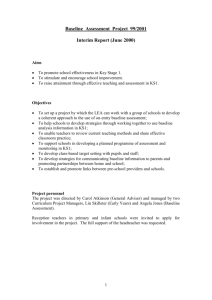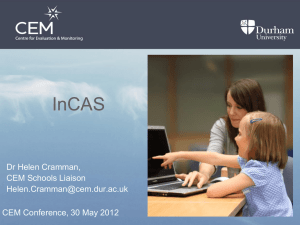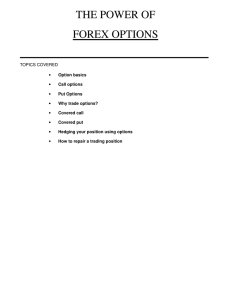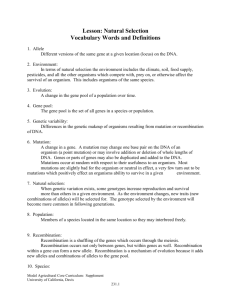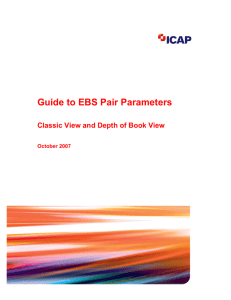Predicting Achievement in the Early Years: How Influential is
advertisement
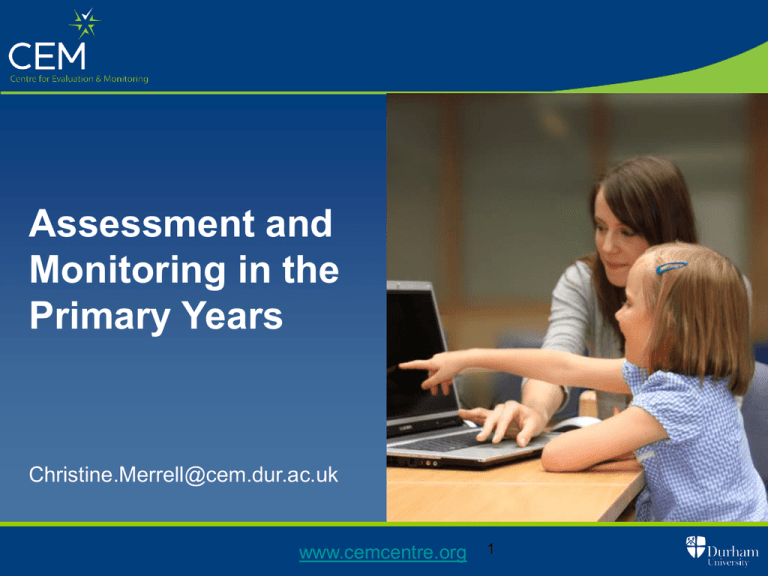
Assessment and Monitoring in the Primary Years Christine.Merrell@cem.dur.ac.uk www.cemcentre.org 1 International Primary • • • • • • • • • • • • England Scotland Wales Australia New Zealand Netherlands Germany South Africa Hong Kong Serbia Luxembourg International Schools 2 Why assess? • Profile of strengths and weaknesses for planning appropriate learning experiences • Early indicator of special educational needs • Monitor progress and attitudes of pupils and cohorts over time 3 • Comparisons – – – – – Children within a class Groups such as boys/girls Classes within a year-group Current cohorts with previous ones Other schools within a consortium and nationally • Progress over time • Research – Within school – Nationally and internationally 4 • Layers of information: – Diagnostic at pupil-level – Group and class trends – School-level information (including trends over time) – Consortium/Authority-level 5 Designing a baseline assessment for young children • For value-added purposes, need items that are good indicators of later attainment 6 Correlation = 0 7 Correlation = 1 8 Correlation = 0.7 9 Child development and predicting later attainment • Speech & Language – – – – – – – Before 6 months vowels are predominant After 6 months use of consonants 8 months: Babbling 1 year: 6 words recognised by mother 18 months: Approx. 50 words understood by mother 2 years: Mother understands language 3 years: Other adults understand language 10 Reading When beginning to read, children need different types of knowledge: • Global and cultural awareness • Vocabulary and basic understanding of language • Conventions of print • Phonological awareness 11 Mathematics • Babies born with numerosity of small quantities – Before acquisition of language – Subitising 12 Early Arithmetic Subitising Learning to count Learning simple arithmetic 13 What would you include in a baseline assessment? • • • • • Drawing Marshmallows Language Maths Phonological awareness • PSED • Motor skills 14 ASPECTS • Baseline Assessment for Foundation Stage – Early Language and Maths – PSED – Motor Development • Test/retest reliability for reading and maths = 0.82 15 ASPECTS • Demo of assessment 16 PIPS On-entry Baseline & Follow-up • Assesses – Early reading and vocabulary – Phonological Awareness – Early maths – Personal, social and emotional development – Short-term memory – Attitudes (End of Year only) – Behaviour (End of Year only) • Test/retest reliability for reading and maths = 0.98 17 PIPS Baseline • Demo of assessment 18 Years 1 - 6 PIPS or InCAS • Maths • Reading • Developed Ability ½ hour ½ hour – Picture vocabulary – Non-verbal ability ½ hour • Attitudes 19 PIPS Years 1 - 6 • Standardised scores and grades for – – – – Maths Reading Science (Year 6 paper-based test only) Developed Ability (Context) • Vocabulary • Non-verbal ability • Attitudes • Value-added – Prior – Context 20 InCAS Years 1 - 6 • Age-equivalent scores for: – General Maths • Number 1, Number 2, MSS and Data – Mental Arithmetic • Addition, Subtraction, Multiplication, Division – Reading • Word Recognition, Word Decoding, Text Comprehension – Spelling – Developed Ability • Vocabulary, non-verbal ability – Attitudes • Longitudinal pupil progress 21 Traditional approach Low Average High 22 Individual approach Low Average High 23 How It Works Easy Difficult Age 1st Question X X X X X X X X 24 Administration • PIPS – Fixed assessment periods – Pencil and paper or CD (installed on school network) – Group assessment – Feedback • Approx 6 weeks for pencil and paper • Quicker for CD • InCAS – Administer at any time of year – CD (installed on school network) – Group assessment – Feedback • Within 24 hours 25 Pricing structure • PIPS – Annual cost per year-group – Annual cost per pupil • InCAS – Annual cost per school – Annual cost per pupil 26
